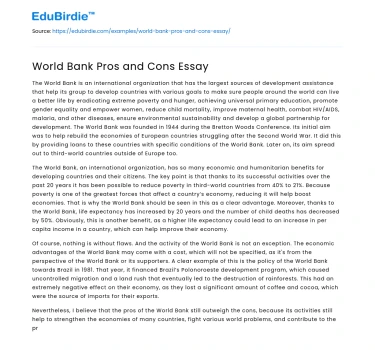The World Bank is an international organization that has the largest sources of development assistance that help its group to develop countries with various goals to make sure people around the world can live a better life by eradicating extreme poverty and hunger, achieving universal primary education, promote gender equality and empower women, reduce child mortality, improve maternal health, combat HIV/AIDS, malaria, and other diseases, ensure environmental sustainability and develop a global partnership for development. The World Bank was founded in 1944 during the Bretton Woods Conference. Its initial aim was to help rebuild the economies of European countries struggling after the Second World War. It did this by providing loans to these countries with specific conditions of the World Bank. Later on, its aim spread out to third-world countries outside of Europe too.
The World Bank, an international organization, has so many economic and humanitarian benefits for developing countries and their citizens. The key point is that thanks to its successful activities over the past 20 years it has been possible to reduce poverty in third-world countries from 40% to 21%. Because poverty is one of the greatest forces that affect a country’s economy, reducing it will help boost economies. That is why the World Bank should be seen in this as a clear advantage. Moreover, thanks to the World Bank, life expectancy has increased by 20 years and the number of child deaths has decreased by 50%. Obviously, this is another benefit, as a higher life expectancy could lead to an increase in per capita income in a country, which can help improve their economy.
Of course, nothing is without flaws. And the activity of the World Bank is not an exception. The economic advantages of the World Bank may come with a cost, which will not be specified, as it's from the perspective of the World Bank or its supporters. A clear example of this is the policy of the World Bank towards Brazil in 1981. That year, it financed Brazil’s Polonoroeste development program, which caused uncontrolled migration and a land rush that eventually led to the destruction of rainforests. This had an extremely negative effect on their economy, as they lost a significant amount of coffee and cocoa, which were the source of imports for their exports.
Nevertheless, I believe that the pros of the World Bank still outweigh the cons, because its activities still help to strengthen the economies of many countries, fight various world problems, and contribute to the prosperity of today's society.






 Stuck on your essay?
Stuck on your essay?

